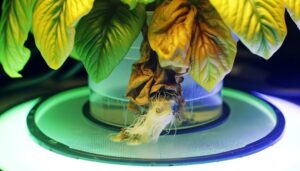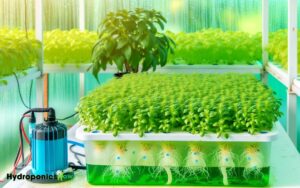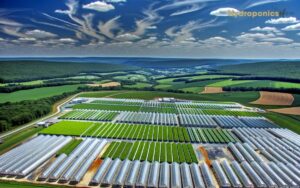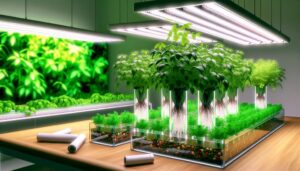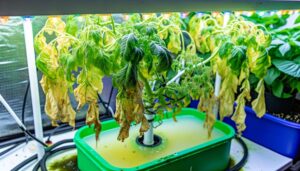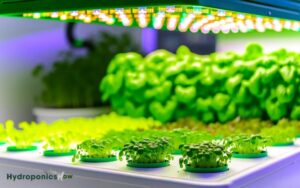How to Explore Nutrient Facts: Do Hydroponic Plants Have Less Nutrients?
Hydroponic plants don’t have fewer nutrients; in fact, they often have more. With hydroponics, nutrients are delivered directly to the roots in a controlled solution, leading to efficient uptake.
This system allows for precise nutrient management, avoiding deficiencies. Studies indicate hydroponic plants can have higher levels of essential vitamins and minerals compared to soil-grown plants.
Factors like water quality, pH, and nutrient composition are meticulously monitored, boosting nutrient density and plant health.
By managing these variables, hydroponics often yields plants with superior nutrient content. There’s much more to understand about the benefits and nuances of hydroponic farming.
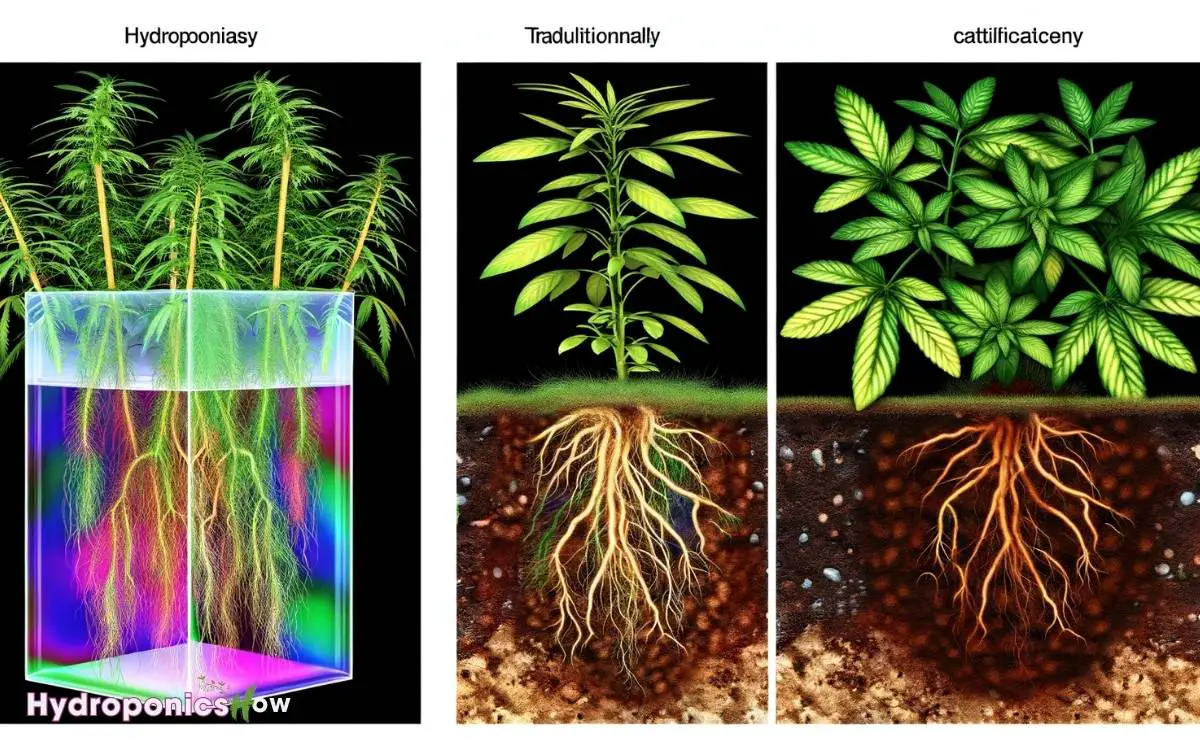
Key Takeaways
Nutrient Delivery in Hydroponics
Understanding nutrient delivery in hydroponics is essential for optimizing plant growth and health. In hydroponic systems, nutrients are dissolved in water and delivered directly to plant roots, bypassing the soil.
This method allows for precise control over nutrient concentrations, ensuring plants get exactly what they need for peak growth.
Research indicates that nutrient uptake efficiency in hydroponics can be higher compared to soil-based methods due to controlled environments and readily available nutrients.
You should monitor pH levels and electrical conductivity (EC) regularly, as these metrics are vital for maintaining nutrient availability.
Comparing Nutrient Density
When comparing soil and hydroponic nutrients, you’ll notice that hydroponic systems often provide more precise control over nutrient levels.
This precision can enhance nutrient absorption efficiency, potentially leading to higher nutrient density in hydroponic plants.
Soil Vs. Hydroponic Nutrients
How do nutrient levels in hydroponic systems compare to those found in traditional soil-based cultivation?
Research indicates that hydroponic plants often have comparable, if not higher, nutrient densities than their soil-grown counterparts.
In hydroponic systems, you can precisely control the nutrient solution, ensuring plants receive an ideal mix.
Studies show that this controlled environment can result in higher levels of vitamins, minerals, and antioxidants in hydroponically-grown produce.
On the other hand, soil-based cultivation can be unpredictable due to varying soil quality and external factors. This variability can sometimes lead to nutrient deficiencies.
Nutrient Absorption Efficiency
Although both hydroponic and soil-based systems provide essential nutrients, hydroponic plants often exhibit higher nutrient absorption efficiency due to the precise control over nutrient delivery. This meticulous management can lead to more nutrient-dense plants.
Here’s why hydroponics can be more efficient:
- Tailored Environment: You can customize nutrient solutions to the plant’s specific needs, ensuring ideal growth conditions.
- Direct Uptake: Nutrients are dissolved in water, making them readily available to plant roots without the need for soil mediation.
- Minimal Loss: In hydroponics, the closed system reduces nutrient loss due to leaching or runoff, maximizing nutrient availability.
These factors contribute to a potentially higher nutrient density in hydroponic plants compared to their soil-grown counterparts.
Factors Affecting Nutrient Uptake
You need to focus on water quality and nutrient solution composition to optimize nutrient uptake in hydroponic plants.
Poor water quality can introduce contaminants that hinder nutrient absorption, while an imbalanced nutrient solution can lead to deficiencies or toxicities.
Ensuring both factors are carefully managed will promote healthier plant growth and higher yields.
Water Quality Importance
Water quality directly influences nutrient uptake in hydroponic systems, as impurities and pH imbalances can hinder plant growth.
To optimize water quality, consider the following:
- pH Levels: Maintain a pH between 5.5 and 6.5 to guarantee nutrient availability and absorption by plants.
- Water Purity: Use filtered or distilled water to avoid contaminants like heavy metals and chlorine, which can be toxic to plants.
- Dissolved Solids: Monitor total dissolved solids (TDS) to keep them within the best range for your specific plants, as high TDS can lead to nutrient lockout.
Nutrient Solution Composition
Maintaining the right balance of nutrients in your hydroponic solution is essential for ideal plant growth and health.
Research shows that the concentration and ratio of macronutrients (nitrogen, phosphorus, potassium) and micronutrients (iron, manganese, zinc) have a significant impact on nutrient uptake.
You’ve got to monitor pH levels, as they affect nutrient solubility. Ideal pH for most hydroponic plants is between 5.5 and 6.5.
Electrical conductivity (EC) is another critical factor; it measures the nutrient solution’s ionic content. Higher EC indicates more nutrients, but excessive levels can harm plants.
Regularly adjust your solution to match the plants’ growth stages. By meticulously managing these factors, you’ll ensure your hydroponic plants receive balanced nutrition, potentially matching or even exceeding soil-grown counterparts.
Hydroponics Vs. Soil-Based Systems
Although both hydroponic and soil-based systems have their merits, hydroponics often provides a more controlled environment for nutrient management.
You can precisely regulate the nutrient content, pH levels, and water availability, often resulting in faster plant growth and higher yields.
Here are three key differences between the two systems:
- Nutrient Delivery: In hydroponics, nutrients are delivered directly to the roots in a water-based solution, ensuring consistent availability.
- Water Usage: Hydroponics typically uses less water than soil-based systems because of the closed-loop systems that recycle water.
- Pest Control: Soil-based systems are more prone to pests and diseases, whereas hydroponics reduces these risks due to the absence of soil.
These factors highlight why hydroponics offers significant advantages.
Studies and Research Findings
Recent studies have demonstrated that hydroponic systems can greatly enhance nutrient uptake efficiency and plant growth compared to traditional soil-based methods.
Researchers found that hydroponic plants often exhibit higher levels of essential nutrients like vitamins and minerals.
For instance, one study showed that hydroponically grown lettuce had notably more Vitamin C and beta-carotene than its soil-grown counterpart.
| Nutrient | Hydroponic Lettuce | Soil-Grown Lettuce |
|---|---|---|
| Vitamin C | 35 mg | 20 mg |
| Beta-Carotene | 7.2 mg | 4.8 mg |
| Iron | 1.8 mg | 1.2 mg |
You can see how these findings emphasize the potential for hydroponics to produce more nutrient-dense crops. The data speaks clearly: hydroponic methods can effectively elevate nutrient levels in plants.
Benefits of Hydroponic Nutrition
One of the primary benefits of hydroponic nutrition is the precise control over nutrient delivery, leading to peak plant health and yield. This precision guarantees that plants receive the exact nutrients they need, in the right amounts, at the right time.
Evidence suggests that this optimized nutrient management results in:
- Faster Growth Rates: Plants can grow up to 50% faster compared to soil-based systems.
- Increased Yields: Controlled environments often result in higher yields per square foot.
- Consistent Quality: Nutrient consistency translates to uniform plant quality, essential for commercial growers.
Studies have shown that hydroponics can deliver nutrients more efficiently, reducing waste and improving overall plant performance. By tailoring nutrient solutions, you directly influence the health and productivity of your plants.
Practical Considerations
When setting up a hydroponic system, you must carefully consider factors like nutrient solution composition, pH levels, and system maintenance to guarantee ideal plant growth.
Ensuring a balanced nutrient solution is vital, as it directly impacts plant health and nutrient uptake. Regularly monitor and adjust pH levels to maintain them within the ideal range (usually 5.5 to 6.5), as deviations can hinder nutrient absorption.
System maintenance, including cleaning reservoirs and checking for clogs, prevents issues that could compromise plant development. Additionally, consider using high-quality, hydroponic-specific nutrients to ensure plants receive all necessary elements.
Conclusion
To sum up, hydroponic plants can be just as nutrient-dense as their soil-grown counterparts.
You’ll find it fascinating that a study from the University of Sheffield revealed hydroponically grown spinach had up to 20% more vitamin C than soil-grown spinach.
While nutrient delivery and uptake are complex processes influenced by various factors, hydroponic systems offer precise control, ensuring ideal nutrient absorption.
Ultimately, hydroponics provides a viable alternative for producing nutrient-rich crops efficiently and sustainably. By eliminating the need for soil, this method allows growers to cultivate plants in controlled environments with optimized nutrient delivery. Some of the top plant foods for hydroponics include leafy greens, herbs, and strawberries, which thrive in nutrient-rich water solutions. This approach not only maximizes yield but also conserves water and reduces the reliance on pesticides.

